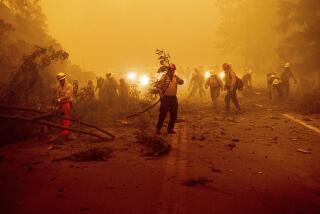Gov. Brown signs new laws to boost climate change spending in California’s low-income communities
Gov. Brown signs new laws to boost climate change spending in California’s low-income communities
Hailing the measures as a way to advance California’s climate change programs through new investments and greater equity across the state, Gov. Jerry Brown signed four bills Wednesday to increase spending to combat greenhouse gas emissions and direct more of that money to low-income communities.
“We’re really transforming and spurring innovation,” Brown said. “And that means new jobs, new technologies and a better way of life.”
The event comes a week after the governor signed legislation at a ceremony in downtown Los Angeles to extend and strengthen the state’s greenhouse gas reduction targets as well as give legislators more say over how that will happen.
Wednesday’s event was in Fresno, the largest city in the San Joaquin Valley, where the state hopes to target much of the new spending as a way to help poorer communities disproportionately affected by pollution and climate change.
“We will be closing the green divide that we see between the coast and the valley,” said Assemblyman Jimmy Gomez (D-Echo Park), who authored one of the bills.
Under the measures signed Wednesday, the state will spend $900 million generated by its cap-and-trade program, a key plank in the state’s climate change efforts that forces polluters pay to release emissions. The money will fund the state’s popular electric-car rebates and transit, rail and park projects, among other programs.
The other bills Brown signed will determine how some of the money is spent. Electric-car rebates will now be available only to those making $150,000 a year or less. Another measure would increase the percentage of climate-related dollars going toward low-income communities. A third would create and fund a new program for disadvantaged communities to develop local efforts to combat climate change, such as more low-income housing and pedestrian walkways.
All of the measures were advanced this year as many lawmakers representing low-income communities of color made themselves a force in the state’s climate change debate after complaints that existing policies weren’t doing enough to benefit the districts they represent.
Latest updates
More to Read
Get the L.A. Times Politics newsletter
Deeply reported insights into legislation, politics and policy from Sacramento, Washington and beyond. In your inbox three times per week.
You may occasionally receive promotional content from the Los Angeles Times.










